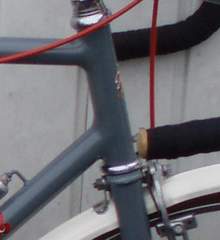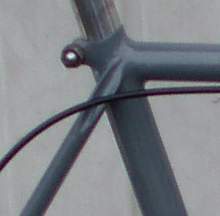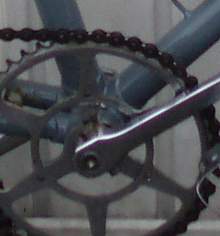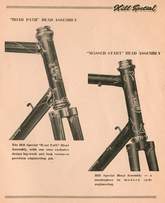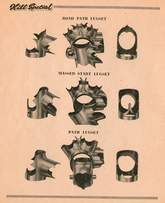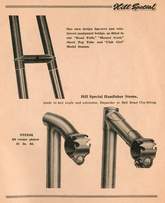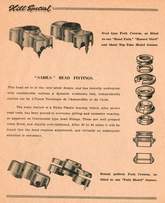Hill, Bros
Posted: Saturday 06th June 2020
Adam Hill started in business in Padiham, Lancashire, at the young age of seventeen. Adam, although born in Rochdale in 1914, had been brought up in Padiham and started by repairing bikes and business grew until, by 1933 he was building the all chrome racer – “ to the envy of other manufacturers ”.
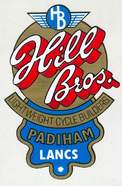
Various premises were used on Burns Street, close to the family home. First number 19, then the bigger double fronted number 18, and then the corner house number 22 where the basement was converted to a gymnasium for the use of local cyclists and athletes. A shop was then opened close by at the corner of Victoria Street and Milton Street.
In 1936/7 Adam studied metallurgy at Manchester and this knowledge was put to good use in the business and during the war when he worked in the aircraft industry. Plans had been made for Adam and his brother Tom to go into partnership and the company Hill Brothers Cycle Engineering was formed just before the war. However the partnership never came into being as the two brothers followed different courses but Adam retained the company name which was used through the late 1940s, and 1950s.
After the war the three storey premises at Eccleshill Street were obtained and named The Clarion Cycle Works (now the site of a small car park). The works were so called because of Adam’s membership of the then flourishing Clarion Cycle Club which boasted sections in each of the Lancashire Cotton towns, as well as hundreds of sections nationally.
Adam exhibited at the post war cycle shows at Earls Court from 1948 onwards and the company flourished because of the high standard of workmanship which was reflected in the “Rolls Royce” pricing of frames and bikes. Adam was also a founder member of the Lightweight Cycle Manufacturers Association which was set up to give the smaller, specialist, frame builders a stronger marketing platform against the large mass production firms.
An employee, but no relation, was Billy Hill who was a considerable innovator and who helped to increase the technical expertise on which the company’s reputation was founded.
Production and sales grew and at one time in the 1950s twenty people were employed at the works with yearly production running into thousands. Many of the “cracks” of the pre- and post-war years could be seen on Hill Specials – particularly the Road Path model .
Pre-war frames were built using Chater Lea fittings, later Adam used his own “Massed Start” and “Path” lugs with Chater Lea ends and mudguard plates on fork blades and stays. Later still a slightly tailored version of the Nervex Professional lugset was used on the “Road Path“ model.
Some all welded frames with lugged bottom bracket were produced as were some frames with short 4” reinforcing struts between seat tube and chainstay.
Frames were originally branded as “Hill” with a better quality being branded ” Hill Special” but soon all production was branded as “Hill Special”. Frame numbers normally appear under the bottom bracket and on the steerer tube.
Early numbering is in the form of five digits the first two being year of manufacture but from 1950 took the amended form of a letter followed by three or four numbers (C is known to be 1950).
An identifying feature of the frames is the distinctive “wrap round” where the rear brake bridge was extended to form an extension round the seat stay.
Another feature was the large number of the distinctive fully chromed frames that were produced – money no object! – with elaborate spearpointed flamboyant overspray at the tube junctions but leaving the lug chrome exposed. To produce these the individual tubes were polished after cutting and mitreing and, whilst this helped the plater to produce a superb finish, it certainly put pressure on the frame builder to produce at tidy job! Sadly few of these frames remain with the overspray and transfers in place.
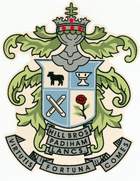
Down tube transfers took various forms with an arrow pierced Hill Special being an early version, followed by a black and red three dimensional script design with later on plain black and white blocks. The original Hill Bros head and seat transfer matched the style of the script of the down tube transfer, this was later supplemented by an elaborate crest based on the Padiham Town Coat of Arms and the motto “Virtutis Fortuna Comes” – “Fortune, the Companion of Valour”. This was later modified for Blackpool production with a central red rose on a white background replacing the more elaborate coat of arms used at Padiham.
In the 1950s Adam bought the rights to the Merlin name from Ernie Merlin and these were produced alongside the Hill Special range.
Following the recession in the cycle trade in the late 1950s Adam heard that Claud Butler was in financial difficulties and drove down to London and purchased the tools and the goodwill of the business from him. It is possible that Adam also bought the rights to the Saxon name as some twin tube frames were later built but the current ownership of this name is not know.
Unfortunately, the Hill Brothers business was itself in difficulty and a meeting of creditors was held in 1958 to review the situation. It is a comment on the creditors regard for Adam that they asked that he should continue in business and repay money from future profits but Adam, who was not enjoying good health, could not face this prospect and so the Clarion Cycle Works was closed and production at Padiham ceased after twenty years.
At about this time Adam sold the rights to the Merlin name to Bob Jackson who used it to produce a range alongside his own.
Adam moved, temporarily, to Jersey to join his brother Tom, Adam then moved to the Lake District where he and his wife ran a guest house but Adam’s heart belonged in Lancashire and he returned to open a retail shop on Padiham Road, Burnley. This was a short lived venture as cycling was in decline and Adam briefly turned the shop over to Gents Outfitting. After this he spent a time as Chief Inspector at Main Gas at Padiham.
Dennis Hill, Adam’s son, who had been helping his father, had joined the airforce and his successful cycling career included a win in the 1959 Lancashire Evening Post Tour of the Lakes.
In 1978 Adam moved to Blackpool and following soundings in the industry, he set up, with Dennis and two colleagues from Harbri Engineering (a previous Hill supplier), a new company which started trading in 1980. Assisted by Roger Kowalski building frames – for a short while from 1980 to 1982 – the Hill Special name lived again. Unfortunately, the business climate was not right for volume sales of specialist lightweight frames.
Following the closure of the Blackpool venture the Hill Special name was finally sold by Adam to Jack Wright of Middridge Engineering in Stockton on Tees.
Despite much contrary advice from friends and business colleagues Adam could not get the frame building bug out of his system and made attempts to revive the frame building business in his own name by buying the MKM (Metcalf, Kitching and Mason) business from Ron Kitching, transferring the equipment and materials from Harrogate to Spring Street, Rishton. During 1983 a small quantity of Adam Hill frames were produced, including at least one Saxon twin tube frame.
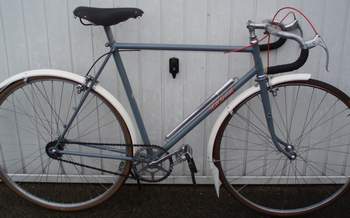
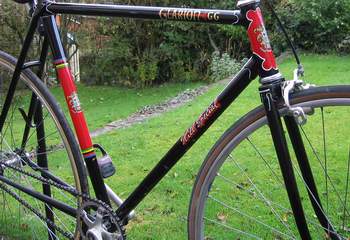
Later that year Adam, helped by his daughter Marion, sold off the remaining stocks of completed frames and components, together with the frame making equipment and the spraying booths and ovens purchased from Ron Kitching to an enthusiast in Liverpool who continued to produce MKM frames for a further 10 years.
After a short and well-earned spell of retirement Adam died in 1990 after a recurrence of his heart trouble.
Dennis continued to tour the continent between spells of framebuilding for various firms, including Argos, but was sadly killed in a road accident in 1998 whilst driving the camper van which had been his travelling home whilst on the continent.
Despite what must have been a large output over the years (the register of frame numbers has been lost) few examples of this first class, and well loved, Lancashire builder remain.
With both Adam and Dennis having died before I started to record this brief history I am grateful to the Hill family, members of the cycle trade and, most of all those Lancashire Hill Special owners who have shared their memories with me and given details of their frames. I have tried to include only information that has come from a number of sources but there will inevitably be errors and omissions and any corrections would be very gratefully received.
Below are four pages from the Hill Special catalogue
Robin Hatherell, 18 Church Close, Waddington, Clitheroe, Lancashire, BB7 3HX – 01200 423691
Hill Special transfers are available from Mr Nick Tithecott, H Lloyd Cycles, PO Box 133, Penrith, CA10 2GH
For further information see Robin Hatherell’s web site dedicated to Hill Special Cycles.
Posted: Saturday 06th June 2020
This article appears in the following categories.
Upcoming Events
Whether you are looking for a gentle social meet up, or a 100-mile ride browse the community’s upcoming events and plan your next weekend outing.

